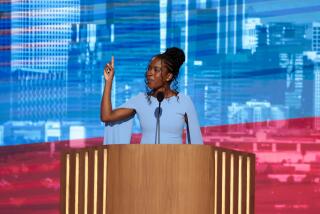Verse by Verse, a Plea for Peace
- Share via
MANCHESTER, Vt. — Just before she read a poem by Walt Whitman, Jamaica Kincaid told a packed New England meetinghouse Sunday evening that she wanted to thank First Lady Laura Bush “for being so thin-skinned.” Otherwise, said poet and author Kincaid, “we would not be sitting here today.”
After the first lady abruptly canceled a White House poetry symposium, owners Edward and Barbara Morrow of Northshire Bookstore decided to organize one of their own. With 11 leading American poets, the event -- dubbed “A Poetry Reading in Honor of the Right to Protest as a Patriotic and Historical Tradition” -- capped a long weekend of antiwar demonstrations around the world and across the country.
Works by Whitman, Emily Dickinson and Langston Hughes had been on the agenda at the White House symposium, which was to have taken place earlier this month but was canceled after some scheduled participants expressed antiwar sentiments. So, along with works of their own, the poets gathered here Sunday read selections from the three giants of American poetry chosen by Bush.
The passages were often sharply political, taking stabs at the prospect of war in Iraq and at the White House “disinvitation” of men and women who make their living, as bookstore owner Edward Morrow put it, practicing “the miraculous art of stitching words into a web.”
Pulitzer Prize winner Galway Kinnell, for example, began with “a little perception and warning” from Dickinson.
“Assent, and you are sane,” read Kinnell. “Demur, you are straightaway dangerous and handled with a chain.”
Before reading from a work by Whitman, Kinnell offered some context for the 19th century poet’s reputation as a brilliant but bitter man who often railed at what he saw as the shortcomings of his country.
“His bitterness was because he loved America so much that he was continually disappointed,” Kinnell said.
That sentiment rang true to many in the audience of 600, who crowded into a church so old that the pastor prefers to call it a meetinghouse, the traditional Colonial term. In the downstairs vestry, an additional 200 watched the proceedings on closed-circuit television.
Canceling the White House poetry session was “just so sad,” said Nelson Jacquaway, an elementary-school teacher in nearby Tinmouth. “After Sept. 11, the president had the opportunity to bring the country together -- and poetry would absolutely have helped to do that.”
Jacquaway, one of dozens in the audience wearing bright green T-shirts that read, “Why Should Vermonters Die for Texas Oil Billionaires?” added: “This is homeland security, keeping the arts alive.”
Poet William O’Daly told the audience about two “staunch Republican” friends who live near him in California’s Sierra foothills. Both are strong supporters of the president, O’Daly said. One friend said the U.S. had to go to war with Iraq because “Saddam Hussein is laughing at us.” The other told O’Daly he had to go to Vermont to take part in the poetry protest -- and then paid for his plane ticket so he could go.
Such a turn of events was encouraging to Grace Paley, recently named Vermont’s state poet. In recent years, Paley said, “I really have had to ransack my heart for hope. I came up with very little.”
But the surge of protests in recent days has been “so hope-making,” said Paley. “I really feel that the rise of the poets had a lot to do with it happening everywhere else in the world.”
Julia Alvarez rescheduled plans to travel to her native Dominican Republic so she could take part in Sunday’s poetry protest here.
After Bush scrapped her symposium, Alvarez said, she sat right down and wrote a poem called “The White House Has Disinvited the Poets.”
Her work describes a sign at the White House that warns: “No poetry until further notice.” And then she imagines a White House valet lamenting the loss of a chance to hear Hughes’ verse at 1600 Pennsylvania Ave.
” ... A little Langston would be good,” the fictional valet grumbles, adding: “Why does the White House have to be so white?”
Zachary Marcus, marketing director of Northshire Books, said he sent an e-mail to President Bush and Laura Bush inviting them to attend Sunday’s gathering, but he received no response.
Marcus noted that the White House might inadvertently have helped the cause of American poetry by canceling the symposium.
“Poetry in America has not received this much attention in 100 years,” Marcus said, prompting Kinnell to counter: “Poetry in America has never received this much attention.”
More to Read
Sign up for our Book Club newsletter
Get the latest news, events and more from the Los Angeles Times Book Club, and help us get L.A. reading and talking.
You may occasionally receive promotional content from the Los Angeles Times.







